Healthcare
Government mandates, inadequate cost containment, high drug prices, and lack of price transparency are increasing premiums and deductibles, making insurance unaffordable. Ten years of the Affordable Care Act resulted in skyrocketing health insurance premiums and unsustainable spending.
Natural Resources
The federal government controls 63% of Idaho’s natural resources. This results in complications for outdoor groups accessing our lands and eliminates high-wage job opportunities in our rural communities. The federal government’s inability to afford proper land management also contributes to extreme wildfires that endanger our health and property.
Economy, Debt, and Deficits
The Trump Administration’s actions to pass historic tax cuts, reduce burdensome regulations, and prioritize domestic manufacturing and energy production unleashed astounding economic growth for our country.
Border Security and Immigration Border Security and Immigration
Through my 24 years of work in the technology industry, I visited 47 countries and found a similarity between these vastly diverse places– countries protect their borders. Protecting the sovereignty of our nation is one of the few constitutionally-granted responsibilities of Congress, and the security of our border had been neglected for far too long.
Agriculture
Through my 24 years of work in the technology industry, I visited 47 countries and found a similarity between these vastly diverse places– countries protect their borders. Protecting the sovereignty of our nation is one of the few constitutionally-granted responsibilities of Congress, and the security of our border had been neglected for far too long.
Abortion
I am strongly and consistently pro-life — both at the beginning and at the end of life. Life begins at conception, and every unborn child has the inherent right to life. The unborn are the least capable of defending themselves, and in the most desperate need of protection. I have voted against every bill that does not uphold the right to life for the unborn and my first speech on the House floor emphasized my pro-life values and the need to protect the unborn.
2nd Amendment, Privacy, and Constitutional Rights
I have always been a staunch defender of the 2nd Amendment and I stand against efforts to erode any American’s constitutional right to bear arms. I will continue to support legislation that advances 2nd Amendment rights of law-abiding citizens.
Cybersecurity
I am concerned with America’s ability to counter cyber attacks on the power grid and other critical infrastructure. These sectors are critical to the function of our daily lives and safety: communications, dams, energy, emergency services, food and agriculture, financial services, healthcare, water, transportation, nuclear reactors, among others.
Defense and Foreign Policy
The U.S. Constitution grants the federal government with the responsibility to protect and defend the people and territory of the United States. A robust defense to protect the sovereignty of the United States is critical to ensure our liberties, freedoms, commerce, and way of life are preserved. I oppose nation-building and excessively long engagements that lack a definition and strategy to win. The job of the military is to fight and win wars to defend our homeland and interests only. These military operations must be approved and supported by a proper act of Congress and led by the U.S. military.
Veterans
I am dedicated to helping our veterans. This is not a partisan situation. A country that commits its people to war must be prepared to take care of them once they come home. Idaho has more than 120,000 veterans — about 10.4% of our adult population. We must ensure that they – and veterans across the country – receive the necessary physical and mental care, on-time and in-full benefits, and quick answers to their questions and concerns.
